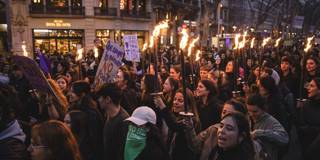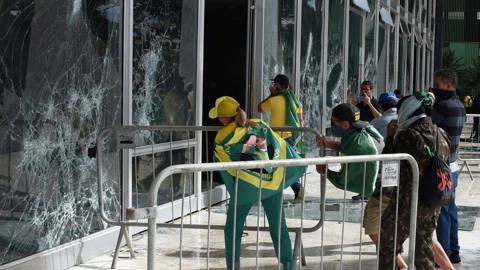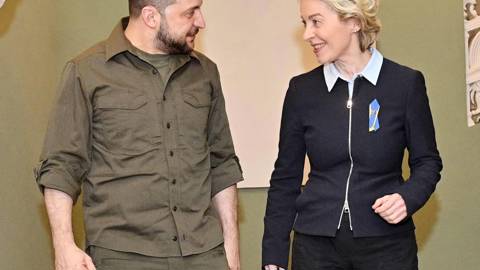Some of the most at-risk activists in the world are women who, often in violent settings, bravely promote a vision of a less violent world. They must not stand alone, and the international community has a responsibility to protect them from retaliation and intimidation.
NEW YORK – Fighting injustice always demands courage, but the risks that women human-rights defenders face are often overlooked. These women bravely embrace the vulnerability that comes with raising their voices, and they must not stand alone. More effort is needed to protect them from reprisal and intimidation.
Women human-rights defenders are on the frontlines of many current conflicts and are some of our most effective peacebuilders. They often work in war zones to prevent or respond to sexual and gender-based violence, which spikes during conflicts and can be used as a weapon of war. The United Nations verified over 3,000 cases of conflict-related sexual violence in 2021. More recently, the Independent International Commission of Inquiry on Ukraine documented cases of Russian soldiers raping women at gunpoint during house-to-house searches.
The women activists who devote their lives to promoting the vision of a less violent world often pay a steep price. In Colombia, Daniela Soto was shot twice in her abdomen by armed civilians in May 2021. She has been advocating for human rights, particularly the rights of indigenous peoples, from a young age. Five months after the attack, Soto spoke at the UN Security Council, lamenting the continued killings of indigenous women leaders by armed groups in her home department of Cauca and other parts of the country.
In Iraq, unidentified gunmen killed Riham Yaqoub in Basra in August 2020. A doctor and human-rights defender, she had led local anti-government protests and advocated for women’s right to use sports facilities and exercise in public. Two days earlier, another defender of women’s and environmental rights survived a shooting attack in the same city, after being subjected to a long smear campaign.
In Sudan, Amira Osman was arrested at her home in Khartoum during a night raid in January 2022 and detained for two weeks. A women’s rights activist, she is the head of the No to Women’s Oppression initiative, which was founded in 2009 in response to unlawful abuses against women and the targeting of women vendors and activists under the now-repealed public-order law. Her arrest did not stop women in Sudan from continuing to protest military rule. Moreover, since fighting between the country’s army and a paramilitary group erupted last month, Sudanese women have been calling for peace and the protection of civilians from violence, and have been demanding that their voices be heard.
Last October, at the UN Security Council’s annual Open Debate on Women, Peace, and Security, Afghan journalist Zahra Nader, the editor-in-chief of Zan Times, gave a shocking account of the Taliban’s violent crackdown on female protesters. She explained that, despite the threat of harassment, detention, and torture, Afghan women “have mobilized the most consistent and peaceful opposition to Taliban policies.” Given that the country’s women were recently banned from working with the UN – only the latest in a long line of decrees aimed at eroding women and girls’ rights – the voices of Afghan women are needed now more than ever.
The situation in Afghanistan is an especially stark example of a broader trend. Extremist political actors, military coups, and unconstitutional behavior by governments have increased repression of human rights worldwide. Even briefing the UN Security Council has become a dangerous undertaking. Several women activists who publicly denounced human-rights violations at the Council faced reprisals, including reports of arbitrary detention and targeted smear campaigns. Several women, fearing for their safety, had to leave their home countries.
Much of the retaliation against women human-rights defenders goes unrecorded; the perpetrators enjoy impunity. Such acts of violence and intimidation are meant to silence, and they often succeed. Some activists self-censor, others shift their focus away from human rights, and some completely withdraw from public life. But many continue their courageous work, and we must urgently defend these women’s lives and provide them with the support they need to continue the fight.
Four steps are urgently needed to help protect women human-rights defenders: First, we need an enabling environment for these activists. That means putting in place legislation and policies that support and protect them and abolishing laws that restrict or even criminalize their work. It also includes measures to ensure their safety online.
Second, providing rapid and flexible funding is crucial. Protection grants, such as those offered by the Women’s Peace and Humanitarian Fund, help women activists pay for security equipment, relocation-related costs, mental-health services, and legal advice.
Governments can also take practical action, such as speeding up the process for granting asylum, temporarily relocating women human-rights defenders under threat, and supporting those who live in exile so that they can continue their activism.
Finally, we need to provide political support to bolster the legitimacy of these activists and hold their attackers to account.
Just as women use their voices to defend human rights, we in the international community must use ours to defend them. We echo UN Secretary-General António Guterres’ words: the protection of women human-rights defenders is a collective moral responsibility. These activists have the most to lose but take the greatest risks. They must not stand alone.






NEW YORK – Fighting injustice always demands courage, but the risks that women human-rights defenders face are often overlooked. These women bravely embrace the vulnerability that comes with raising their voices, and they must not stand alone. More effort is needed to protect them from reprisal and intimidation.
Women human-rights defenders are on the frontlines of many current conflicts and are some of our most effective peacebuilders. They often work in war zones to prevent or respond to sexual and gender-based violence, which spikes during conflicts and can be used as a weapon of war. The United Nations verified over 3,000 cases of conflict-related sexual violence in 2021. More recently, the Independent International Commission of Inquiry on Ukraine documented cases of Russian soldiers raping women at gunpoint during house-to-house searches.
The women activists who devote their lives to promoting the vision of a less violent world often pay a steep price. In Colombia, Daniela Soto was shot twice in her abdomen by armed civilians in May 2021. She has been advocating for human rights, particularly the rights of indigenous peoples, from a young age. Five months after the attack, Soto spoke at the UN Security Council, lamenting the continued killings of indigenous women leaders by armed groups in her home department of Cauca and other parts of the country.
In Iraq, unidentified gunmen killed Riham Yaqoub in Basra in August 2020. A doctor and human-rights defender, she had led local anti-government protests and advocated for women’s right to use sports facilities and exercise in public. Two days earlier, another defender of women’s and environmental rights survived a shooting attack in the same city, after being subjected to a long smear campaign.
In Sudan, Amira Osman was arrested at her home in Khartoum during a night raid in January 2022 and detained for two weeks. A women’s rights activist, she is the head of the No to Women’s Oppression initiative, which was founded in 2009 in response to unlawful abuses against women and the targeting of women vendors and activists under the now-repealed public-order law. Her arrest did not stop women in Sudan from continuing to protest military rule. Moreover, since fighting between the country’s army and a paramilitary group erupted last month, Sudanese women have been calling for peace and the protection of civilians from violence, and have been demanding that their voices be heard.
Last October, at the UN Security Council’s annual Open Debate on Women, Peace, and Security, Afghan journalist Zahra Nader, the editor-in-chief of Zan Times, gave a shocking account of the Taliban’s violent crackdown on female protesters. She explained that, despite the threat of harassment, detention, and torture, Afghan women “have mobilized the most consistent and peaceful opposition to Taliban policies.” Given that the country’s women were recently banned from working with the UN – only the latest in a long line of decrees aimed at eroding women and girls’ rights – the voices of Afghan women are needed now more than ever.
SPRING SALE: Save 40% on all new Digital or Digital Plus subscriptions
Subscribe now to gain greater access to Project Syndicate – including every commentary and our entire On Point suite of subscriber-exclusive content – starting at just $49.99.
Subscribe Now
The situation in Afghanistan is an especially stark example of a broader trend. Extremist political actors, military coups, and unconstitutional behavior by governments have increased repression of human rights worldwide. Even briefing the UN Security Council has become a dangerous undertaking. Several women activists who publicly denounced human-rights violations at the Council faced reprisals, including reports of arbitrary detention and targeted smear campaigns. Several women, fearing for their safety, had to leave their home countries.
Much of the retaliation against women human-rights defenders goes unrecorded; the perpetrators enjoy impunity. Such acts of violence and intimidation are meant to silence, and they often succeed. Some activists self-censor, others shift their focus away from human rights, and some completely withdraw from public life. But many continue their courageous work, and we must urgently defend these women’s lives and provide them with the support they need to continue the fight.
Four steps are urgently needed to help protect women human-rights defenders: First, we need an enabling environment for these activists. That means putting in place legislation and policies that support and protect them and abolishing laws that restrict or even criminalize their work. It also includes measures to ensure their safety online.
Second, providing rapid and flexible funding is crucial. Protection grants, such as those offered by the Women’s Peace and Humanitarian Fund, help women activists pay for security equipment, relocation-related costs, mental-health services, and legal advice.
Governments can also take practical action, such as speeding up the process for granting asylum, temporarily relocating women human-rights defenders under threat, and supporting those who live in exile so that they can continue their activism.
Finally, we need to provide political support to bolster the legitimacy of these activists and hold their attackers to account.
Just as women use their voices to defend human rights, we in the international community must use ours to defend them. We echo UN Secretary-General António Guterres’ words: the protection of women human-rights defenders is a collective moral responsibility. These activists have the most to lose but take the greatest risks. They must not stand alone.